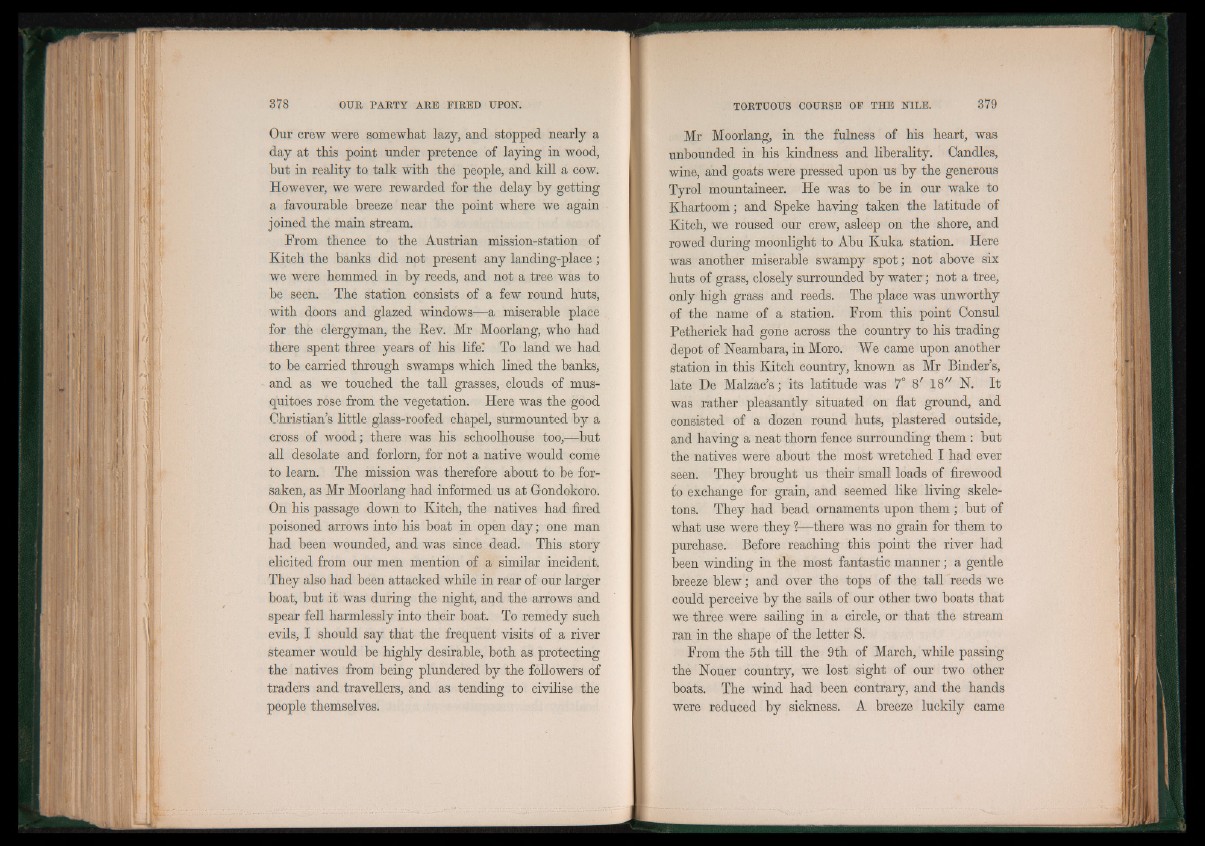
Our crew were somewhat lazy, and stopped nearly a
day at this point under pretence of laying in wood,
but in reality to talk with the people, and kill a cow.
However, we were rewarded for the delay by getting
a favourable breeze near the point where we again
joined the main stream.
From thence to the Austrian mission-station of
Kitch the banks did not present any landing-place ;
we were hemmed in by reeds, and not a tree was to
be seen. The station consists of a few round huts,
with doors and glazed windows—a miserable place
for the clergyman, the Rev. Mr Moorlang, who had
there spent three years of his lifer To land we had
to be carried through swamps which lined the banks,
and as we touched the tall grasses, clouds of mus-
quitoes rose from the vegetation. Here was the good
Christian’s little glass-roofed chapel, surmounted by a
cross of wood; there was his schoolhouse too,—but
all desolate and forlorn, for not a native would come
to learn. The mission was therefore about to be forsaken,
as Mr Moorlang had informed us at Gondokoro.
On his passage down to Kitch, the natives had fired
poisoned arrows into his boat in open day; one man
had been wounded, and was since dead. This story
elicited from our men mention of a similar incident.
They also had been attacked while in rear of our larger
boat, but it was during the night, and the arrows and
spear fell harmlessly into their boat. To remedy such
evils, I should say that the frequent visits of a river
steamer would be highly desirable, both as protecting
the natives from being plundered by the followers of
traders and travellers, and as tending to civilise the
people themselves.
Mr Moorlang, in the fulness of his heart, was
unbounded in his kindness and liberality. Candles,
wine, and goats were pressed upon us by the generous
Tyrol mountaineer. He was to be in our wake to
Khartoom; and Speke having taken the latitude of
Kitch, we roused our crew, asleep on the shore, and
rowed during moonlight to Abu Kuka station. Here
was another miserable swampy spot; not above six
huts of grass, closely surrounded by water; not a tree,
only high grass and reeds. The place was unworthy
of the name of a station. From this point Consul
Petherick had gone across the country to his trading
depot of Neambara, in Moro. We came upon another
station in this Kitch country, known as Mr Binder’s,
late De Malzac’s; its latitude was 7° 8' 18" N. It
was rather pleasantly situated on flat ground, and
consisted of a dozen round huts, plastered outside,
and having a neat thorn fence surrounding them : but
the natives were about the most wretched I had ever
seen. They brought us their small loads of firewood
to exchange for grain, and seemed like living skeletons.
They had bead ornaments upon them ; but of
what use were they ?—there was no grain for them to
purchase. Before reaching this point the river had
been winding in the most fantastic manner; a gentle
breeze blew; and over the tops of the tall reeds we
could perceive by the sails of our other two boats that
we three were sailing in a circle, or that the stream
ran in the shape of the letter S.
From the 5th till the 9th of March, while passing
the Nouer country, we lost sight of our two other
boats. The wind had been contrary, and the hands
were reduced by sickness. A breeze luckily came